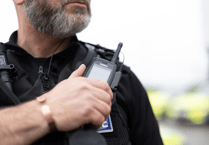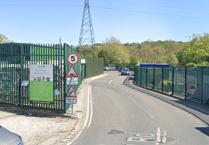A SPECIAL equine training clinic hosted by a Teignbridge horse charity has given professional vets from across the UK a unique opportunity to learn valuable field surgery and anaesthesia skills on semi-feral ponies.
The Mare and Foal Sanctuary teamed up with the British Equine Veterinary Association for the event which enabled vets to demonstrate castration techniques in the field rather than in the operating theatre.
It’s a valuable professional skill and greatly improves the futures of colts who, uncastrated, are often difficult to find homes for.
As geldings they could become riding or companion ponies or they could return to moorland sites to graze in gelding herds, helping land conservation.
Working in partnership with Dartmoor pony keepers, the Mare and Foal Sanctuary invited delegates from BEVA to learn and share best practice at its Beech Trees Veterinary and Welfare assessment Centre in Newton Abbot.
Seven ponies from Dartmoor and three colts from a private owner were brought to the sanctuary ahead of the clinic for pre-operative training, spending more than a month adapting to their new environment, gaining confidence and being expertly trained by staff for close handling by vets.
Syra Bowden, The Mare and Foal Sanctuary’s Head of Equine Welfare says: ‘As a champion of excellence in equine education and welfare, we were glad to host such a valuable training event to help the continuing professional development of 17 vets.
‘The clinic was extremely successful, and nine of the 10 colts were able to undergo surgery, showing calm and relaxed behaviour throughout.
‘Partnerships are vital within the equine community, and we are proud to work so closely with other organisations and owners who put equine welfare at the heart of all they do.’
Seven semi-feral ponies from the Dartmoor Pony Chinkwell Herd, working alongside the Dartmoor Pony Heritage Trust (DPHT), were brought in to take part in the training.
The Chinkwell Herd’s generational farmer and breeder Margaret Rogers said: ‘Collaborative partnership work like this is absolutely essential if we are to meet our objective of the survival of important heritage breeds with very rare bloodlines, following thousands of years roaming Dartmoor.
‘The DPHT is dedicated to supporting breeders and keepers to preserve the native Dartmoor pony on Dartmoor.
‘Iconic breeds like The Dartmoor Pony face a struggle with diminishing numbers and their survival is dependent on breeders being able to sell drift colts that have been handled and castrated successfully. That’s why I’m pleased to have been part of this vital training.’
Head of care for The Mare and Foal Sanctuary, Sally Burton leads the team responsible for training the visiting colts.
She said: ‘We've taken it quite slowly and kept them at a stage where they were always happy with what we were doing and didn’t become fearful or stressed.
‘It’s great to work with other organisations to demonstrate high equine welfare standards and it’s also really important for the heritage breed ponies who might not have such a great future if they can’t be castrated.’





Comments
This article has no comments yet. Be the first to leave a comment.